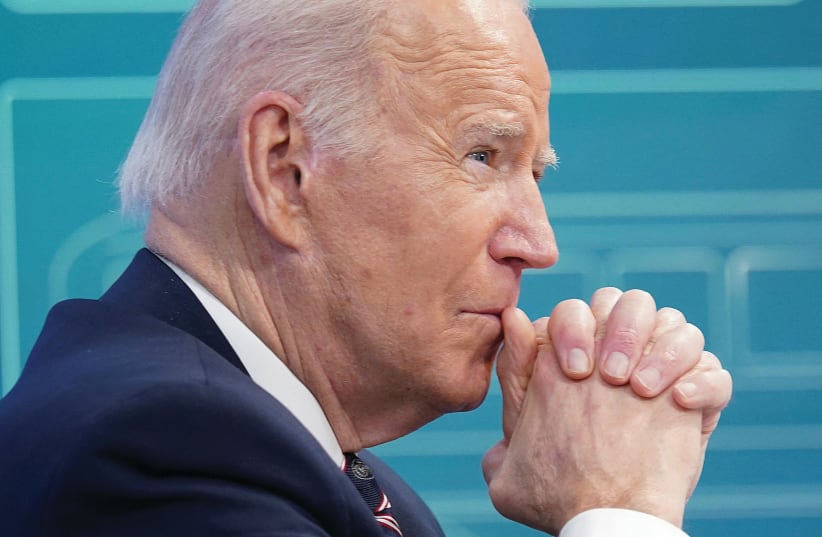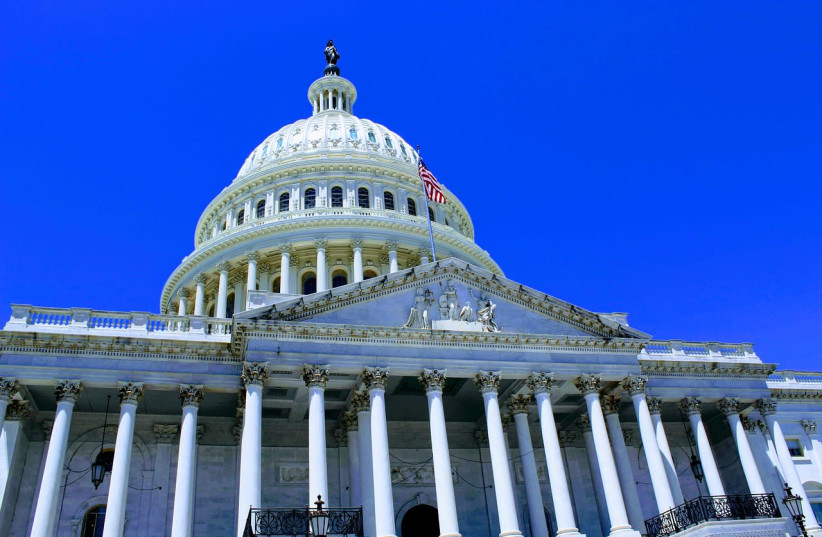Two major events are looming over US President Joe Biden’s response to Russia’s invasion of Ukraine: the chaotic withdrawal from Afghanistan last summer, and the response to the 2014 annexation of Crimea by Russia.
The president is poised to handle the Ukraine crisis better than these two events, as he enters the midterm year. But imposing aggressive economic sanctions against Russia could also affect the US economy. And given that inflation is already at a four-decade high; gas prices are touching $4 a gallon; and the S&P 500 now sits in correction territory, navigating between all these variables in an election year could be tricky.
“This is a thorny political situation with little upside and significant risks for the Biden administration,” said Douglas Kriner, a professor in the department of government at Cornell University.
“The American public has little stomach for any direct military intervention. Biden ran pledging to end the war in Afghanistan, and while many Americans disapprove of its execution, strong majorities still agree that ending the nation’s longest war was the right thing to do. New foreign interventions have only downsides,” added Kriner, who is the author of five books, including After the Rubicon: Congress, Presidents, and the Politics of Waging War.
“At the same time, doing nothing would also entail significant political risks,” he noted. “Many Americans may say ‘this is not our fight,’ but if Russia invades Ukraine with only a feckless American response, the administration will appear weak and pay a political price. Would-be critics currently sitting quietly on the sidelines will unleash after the fact.”
He said that the best thing the administration can do right now is to secure as much bipartisan support from Congress as it can on sanctions and additional military aid to Ukraine.
“This could insulate the administration from a double-barreled assault, with some criticizing it for not doing enough, while others argue it has gone too far,” said Kriner. “And getting members on record supporting these measures now would help soften future criticism, should their deterrent power prove insufficient.
“In short, the biggest domestic political threat to the administration is vocal and sustained congressional criticism,” he said. “Getting Congress on board and on record as quickly as possible will not only bolster the credibility of American retaliatory threats, but it will also provide the administration with invaluable political cover.”
According to Dov Zakheim, senior adviser at the Center for Strategic and International Studies, former undersecretary of defense during the George W. Bush administration, and former deputy undersecretary of defense for planning and resources during the Reagan administration, “from an international perspective, Biden had done very well” by bringing NATO together.
“There are 30 countries in NATO, and he’s kept them all together so far,” he said. “Getting the Germans to suspend the Nord Stream 2, I think, was a real accomplishment.”
“On the other hand, sanctions are not going to do very much,” said Zakheim. “The only sanctions that would work would be oil and gas. And the difficulty, of course, is, that [according to a recent poll] only 26% of Americans really seem to care about this. And so when oil and gas prices go up, [people are] going to push back – and you have a legislative election coming up.
“The Republicans already look like they’re going to take the House back,” he noted. “Maybe they will take the Senate back as well. Biden is worried about that, [but] leadership is all about leadership – just because the American people aren’t interested, that doesn’t mean that Biden shouldn’t do something,” he continued. “Think about Roosevelt – he had an isolationist America, and he supported the British anyway. That’s what leadership is about. If you follow what the polls say, that’s not going to help you.”
He went on to say that “unless [Russian President Vladimir] Putin sees that we’re going to stand up to him, he’s going to keep going, and then where does it stop? Part of historic Russia includes Poland, Lithuania, Latvia, Estonia and Moldova. If you’re talking about restoring the Russian Empire, there’s a lot of countries [that were] part of that. So where is it going to stop?”
According to Aaron David Miller, a senior fellow at the Carnegie Endowment for International Peace, the point of departure for American performance “is the debacle of the Afghan withdrawal.
“I think Putin is actually quite surprised by what Biden has managed to do in the past three or four weeks,” he said. “Remember, Putin’s calculation [was] that Europe is divided, and the United States bogged down in its own domestic travails.” However, he emphasized, “none of this is going to deter Putin from acting, nor punish him.
“If you ask me to evaluate how Biden is performing, I would be hesitant to identify things that he could do that would be effective, that he has not already done,” said Miller. “Once you take the issue of American deployment of US forces in Ukraine off the table, you are left with a number of sanctions in the main; countering Russia’s information war, and supporting the Ukrainian military. You are left with a series of bad options, which is not going to deter [Putin].
“We could argue about whether or not Biden should have moved earlier on sanctions,” he continued. “But frankly, I don’t see much that he could do that he hasn’t done.”
He said that the American electorate, including him, under no circumstances would support US deployment of American forces in order to defend Ukraine.
“You have an American public really opposed to the deployment of its forces, [and that] doesn’t see why Biden is involved in this at all,” he said.
“The latest Gallup polls [indicated that] 50% or more do not view his handling of the Ukrainian crisis favorably, and it’s going to get worse because if we ultimately do the two things that might actually hurt Putin, one is severe sanctions against major banks and separate them from the financial system. And number two, go after oil exports, which constitute 45% of Russia’s GDP. That could actually hurt, but it’s going to hurt Europe. It’s going to hurt the United States. It could wreak havoc with financial markets. And that’s the downside of using targeted sanctions that are severe. You have to be willing to accept the boomerang effect on your own interests.
“You have to separate out the national interest, which requires all of the steps that Biden has taken from his political interests,” said Miller. “There will be zero credit, in part because Biden cannot win this war. I don’t see any upside politically for Biden. It is certainly not in his political interest. On the other hand, he also cannot do nothing. Because you’ve got midterms coming up.”
SO FAR, the US reaction has focused on sanctions against Russian banks and Russian officials. Dr. Alexandra Vacroux, the executive director of the Davis Center for Russian and Eurasian studies at Harvard University, said that the administration “came out very aggressively in the past months, signaling to Putin that there would be dire consequences for invading Ukraine, and that these consequences would be far worse than what Russia experienced following the annexation of Crimea in 2014.
“There is a sense that not enough was done then to deter Putin from further aggression, and the administration is keen not to repeat this error,” she said, but noted that sanctions are not going to deter Putin at the moment.
“They are punishment for actions taken but will not stop him from doing what he plans in Ukraine,” said Vacroux. “Even the threats to sever Russia from the international financial markets by removing them from SWIFT or the US dollar are an ineffective deterrent. For one thing, the Russians appear to believe that these sanctions will be applied anyway. Secondly, Putin seems to have accepted that the cost of controlling Ukraine will be disengagement from the global economy for the short or medium term.”
With nearly five decades of experience, Biden is one of the longest-serving politicians in Washington. He witnessed the rise and fall of so many presidents, and he knows that there is a fine line separating a failed presidency from a successful one. The war in Ukraine, the actions that he will take in the upcoming weeks, and their influence on the US economy could determine whether his own time in office will be classified in the latter category.•

